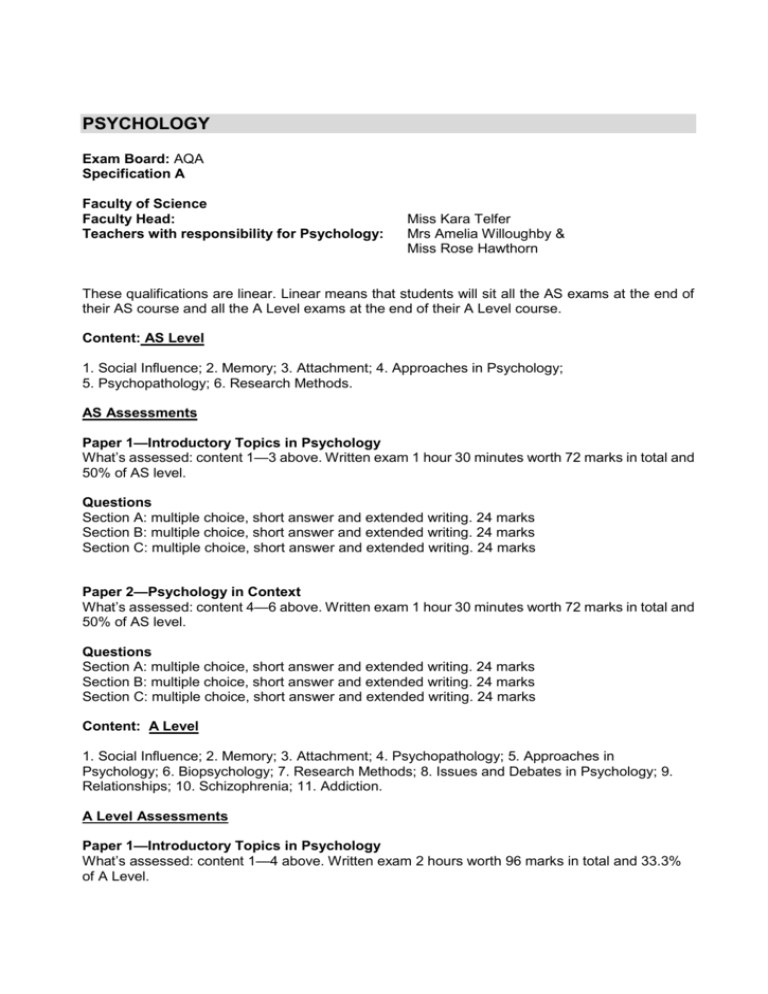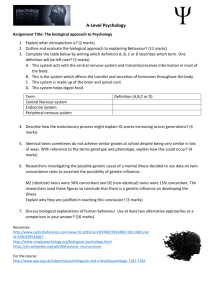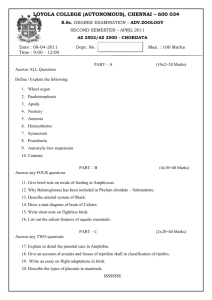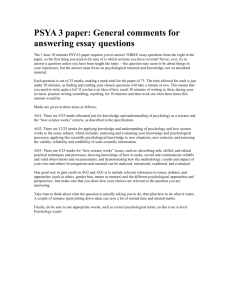PSYCHOLOGY
advertisement

PSYCHOLOGY Exam Board: AQA Specification A Faculty of Science Faculty Head: Teachers with responsibility for Psychology: Miss Kara Telfer Mrs Amelia Willoughby & Miss Rose Hawthorn These qualifications are linear. Linear means that students will sit all the AS exams at the end of their AS course and all the A Level exams at the end of their A Level course. Content: AS Level 1. Social Influence; 2. Memory; 3. Attachment; 4. Approaches in Psychology; 5. Psychopathology; 6. Research Methods. AS Assessments Paper 1—Introductory Topics in Psychology What’s assessed: content 1—3 above. Written exam 1 hour 30 minutes worth 72 marks in total and 50% of AS level. Questions Section A: multiple choice, short answer and extended writing. 24 marks Section B: multiple choice, short answer and extended writing. 24 marks Section C: multiple choice, short answer and extended writing. 24 marks Paper 2—Psychology in Context What’s assessed: content 4—6 above. Written exam 1 hour 30 minutes worth 72 marks in total and 50% of AS level. Questions Section A: multiple choice, short answer and extended writing. 24 marks Section B: multiple choice, short answer and extended writing. 24 marks Section C: multiple choice, short answer and extended writing. 24 marks Content: A Level 1. Social Influence; 2. Memory; 3. Attachment; 4. Psychopathology; 5. Approaches in Psychology; 6. Biopsychology; 7. Research Methods; 8. Issues and Debates in Psychology; 9. Relationships; 10. Schizophrenia; 11. Addiction. A Level Assessments Paper 1—Introductory Topics in Psychology What’s assessed: content 1—4 above. Written exam 2 hours worth 96 marks in total and 33.3% of A Level. Questions Section A: multiple choice, short answer and extended writing. 24 marks Section B: multiple choice, short answer and extended writing. 24 marks Section C: multiple choice, short answer and extended writing. 24 marks Section D: multiple choice, short answer and extended writing. 24 marks Paper 2—Psychology in Context What’s assessed: content 5—7 above. Written exam 2 hours worth 96 marks in total and 33.3% of A Level. Questions Section A: multiple choice, short answer and extended writing. 24 marks Section B: multiple choice, short answer and extended writing. 24 marks Section C: multiple choice, short answer and extended writing. 48 marks Paper 3—Issues and Options in Psychology What’s assessed: content 8—11 above. Written exam 2 hours worth 96 marks in total and 33.3% of A Level. Questions Section A: multiple choice, short answer and extended writing. 24 marks Section B: multiple choice, short answer and extended writing. 24 marks Section C: multiple choice, short answer and extended writing. 24 marks Section D: multiple choice, short answer and extended writing. 24 marks Requirements: You will need to be able to communicate in a clear and effective manner, to analyse and evaluate, to design, conduct and report psychological investigations and to collect and draw conclusions from data. You will also need to be able to select and use a form and style of writing appropriate to the subject matter. Expectations: You will be expected to: - make observations and produce facts (data about the world) - construct a theory to account for a set of related facts - generate expectations (hypotheses) from the theory - collect data to test expectations - adjust theory in response to data collection Pattern of Work: A mixture of short written answers and extended writing each week Outside the Classroom: There will be investigations to conduct Career possibilities: Psychology leads to a wide range of careers, such as counselling, educational psychology, sport psychology, forensic psychology or business psychology. It also develops a range of skills— accurate analysis, logical thinking, interaction with others—that will be an asset in a great many careers. It will also improve your understanding of yourself and others. Common Questions: What is Psychology? It is the scientific study of behaviour and experience Isn’t it just ‘common sense’? No, because you need to collect objective and verifiable facts about behaviour and construct empirically based theories. Is it better to wait and study it from scratch at University? The advantage of studying it at school is that you can gain some idea of what it is all about before committing yourself to a University course. It will also give you a head start if you do decide to continue at University. What is Cognitive Psychology? The study of how we learn, remember and think. What is Developmental Psychology? Learning about how people change through the course of their life as a result of what they inherit and what they experience. What is Physiological Psychology? Seeing the way we behave as the functioning of our nervous system. What is Social Psychology? Studying how far we are influenced by others and how we relate to them.







